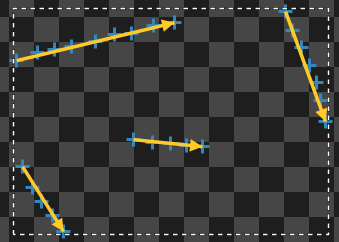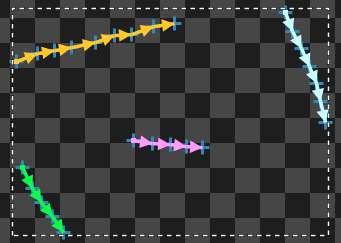Back to Adaptive Vision Studio website
Set inMaxRank to larger value to allow detecting paths that lie close to each other.
Set inMaxTurnAngle to larger value when points do not lie precisely on a segment.
Set inMinPointCount to filter out too short paths (useful when some of the input points are noise).
You are here: Start » Filter Reference » Geometry 2D Fitting » DetectPointSegments
Detect points that lie along multiple segments.
| Name | Type | Range | Description | |
|---|---|---|---|---|
 |
inPoints | Point2DArray | Points to connect | |
 |
inMaxDistance | Real | 0.0 -  |
Maximum distance between connected points |
 |
inMaxRank | Integer | 1 -  |
Maximum number of neighbour candidates considered when joining points |
 |
inMaxRelativeDistance | Real* | 1.0 -  |
Maximum distance in relation to the shortest distance for a point |
 |
inMaxTurnAngle | Real | 0.0 - 90.0 | Maximum angle between consecutive path segments |
 |
inMinPointCount | Integer | 2 -  |
Minimum number of points in one path |
 |
outPointSegments | Segment2DArray | Segments connecting first and last point of each path | |
 |
outPaths | PathArray | Paths of connected points | |
Description
Use this filter to detect multiple segments or paths at the same time.
Set inMaxDistance to smaller value to avoid connecting distant points.Set inMaxRank to larger value to allow detecting paths that lie close to each other.
Set inMaxTurnAngle to larger value when points do not lie precisely on a segment.
Set inMinPointCount to filter out too short paths (useful when some of the input points are noise).
Filter returns array of paths as well as segments connecting first and last point of each path.
Examples
Results for input parameters: inMaxDistance = 30, inMaxRank = 4, inMaxTurnAngle = 20, inMinPointCount = 4.

The resulting outPointSegments drawn with the input points. |

The resulting outPaths drawn with the input points. |
Complexity Level
This filter is available on Advanced Complexity Level.
See Also
- FitSegmentToPoints – Approximates points with a segment using selected outliers suppression method.


